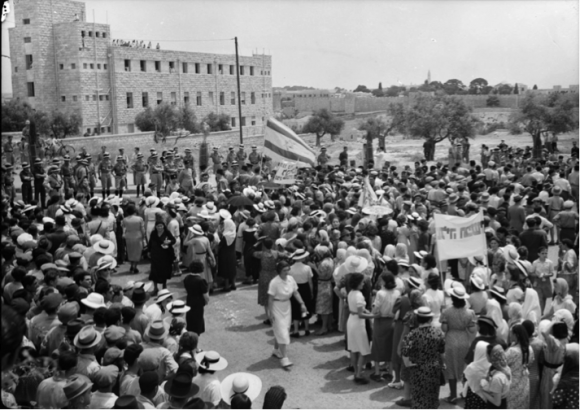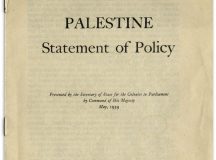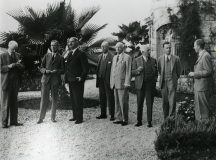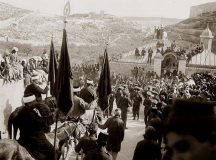Using documents in the National Archive, including German documents photographed and sent to Whitehall by an American spy, Yaakov Lappin looks at why Britain reversed policy and abandoned partition, or what we now call the two state solution, and imposed strict limits on Jewish immigration to Palestine in 1939. ‘The engine powering policy reversal against partition‘ he concludes, was ‘the German, and to a lesser extent Italian, threat to British interests in Europe and in the Middle East, and the subsequent potential for the Arab bloc to abandon the British camp’ on the eve of war.
In the late 1930s, in the space of a few short years, the British government conducted a dramatic policy shift, first abandoning its 1937 acceptance of a proposal to partition Mandatory Palestine between Jews and Arabs, then rejecting the proposal altogether in 1938, before releasing a 1939 White Paper that called for establishing a joint Arab-Jewish-governed state, opposed the establishment of a sovereign Jewish state in Mandatory Palestine, and called for limiting Jewish immigration to a further 75,000 arrivals over the next five years, with any further immigration dependent on Arab consent.
In the National Archives in Kew, London, I studied official British government documents from meetings in the cabinet, the Foreign Office, the Colonial Office, and others. They shed a fascinating light into some of the main considerations behind the change in policy, illustrating how the British government, caught between the demands of two competing national movements, became alarmed by the prospect of Nazi Germany recruiting the Arab Middle East to its side. This fear, more than anything else, drove the British decision to publish its 1939 White Paper.
Peel’s View
The Arab revolt of 1936 had been the first step in internationalising the Arab-Jewish conflict in Mandatory Palestine. Arab Palestinian nationalists were able to capture the attention of, and support for their cause from the wider Arab Middle East, and to turn their campaign against Jewish immigration into a pan-Arab affair.
Britain’s Colonial Office and War Office led the initial policy response, which was to establish the Royal Peel Commission to examine the causes of the disturbances and draw up recommendations. The Foreign Office launched a campaign to push the Peel Commission to meet Arab demands in Palestine, and took a dim view of partition.
Lord Peel, for his part, informed British military Chiefs of Staff that from his own and his Commission’s point of view, a partition of Palestine ‘seemed to offer most chances of success’ and ‘the advantage of such a complete division between the two races would be very great,’ since it ‘would avoid the constant friction between Jew and Arab throughout Palestine … the Jews would have their national home with no restrictions on the number of immigrants,’ and ‘the Arabs would be relieved of their present fear of being overwhelmed by the Jews and would recover to a large extent their independence. They would also have the opportunity of uniting with the other Arab peoples in the hinterland of Palestine.’[i]
Peel was adamant that under partition, ‘both races… would obtain considerable advantages,’ and envisioned that ‘at the end of this transitional period … treaties should be negotiated with the two new states, possibly on the lines of the treaty between ourselves and Iraq’.[ii]
The timing of the revolt was of crucial importance, since, between 1936 and 1939, the prospects of a new global war grew. Britain was forced to begin to ration the imperial resources at its disposal.
By 1939, on the eve of the Second World War, European-power competition over the loyalties of the Arab world had escalated significantly, and the British government viewed the Palestine situation through the prism of rivalry and potentially imminent conflict with the German axis.
The Foreign Office View
During those years, departmental responsibility for the Palestine question shifted. Inter-departmental rivalry, caused by differences in desired goal-attainments, sparked disputes between the local, Palestine-based view of the situation held by the Colonial Office, the military considerations pursued by the War Office, and the wider Middle Eastern and European considerations, which were emphasised by the Foreign Office.
It was the Foreign Office and its anxiety that the whole of the Middle East would revolt against Britain on the eve of a European War that ultimately won this argument.
Even by 1936, as the Peel Commission was on the ground, on its fact-finding mission, the Foreign Office contemplated with concern the increasing intervention of foreign powers in the Palestine conflict, and the effect this would have on British influence in the Middle East.
A report by an anonymous Foreign Office employee identified as the ‘Sudan Agent’ stated that ‘the Palestinian Arabs, aided by sympathisers in all parts, by Syria and Iraqi adventurers, and more important than all, by foreign money and arms – are preparing for open revolt after the publication of the report of the Royal Commission in the event of it not being in their favour’.[iii]
The ‘Agent’ stressed that the involvement of foreign powers is the most worrying aspect of his report. The end goal of the Arab guerrillas, according to the Sudan Agent, is to ‘incite the feeling of the Mohammedan world for action’.[iv] The Foreign Office received several telegrams from its representatives in Arab countries pleading for a change in British policy in Palestine.
The Foreign Office, under the direction of Foreign Secretary Anthony Eden, continually pressed home its case to the Colonial Office, by forwarding to it several Arab communications containing dire warnings for British interests in the Middle East, and solutions proposed by the Arab leaders to end the Arab-Jewish conflict in Palestine.
The Foreign Office, for example, sent the Peel Commission a copy of a telegram that documented Saudi Arabia’s King Ibn Saud’s proposals for a permanent solution to the Palestine conflict, in which he insisted that ‘no more Jews should be allowed in,’ and advocated the prohibition of land sales to Jews.[v] Furthermore, Ibn Saud spelled out his vision for the creation of an Arab state in all of Palestine, with a Jewish minority.
The Foreign Office’s central concern was the possibility of Arab alienation from Britain at a time when Britain’s European rivals were playing a growing role in Arab affairs.
For example, the Foreign Office’s representative in Palestine ‘endeavoured to impress on members of the Royal Commission when they were here that the Palestinian question cannot be considered apart from the Italian problem. What we had to consider … was whether or not we were in a position to take on both the Italians and the Arabs, for that was what would be involved by our continuance of a Zionist policy entirely inacceptable to the Palestinian Arabs.’[vi]
The official also warned that Britain was on the verge of losing Iraqi and Saudi friendships, and that ‘the danger of a general Arab alienation from us through the continuance of a Zionist policy inacceptable to the Palestinian Arabs and the consequent drifting of Arabs towards Italy must be regarded as serious possibilities.’[vii] Another Foreign Office dispatch stresses the ‘press side of Italian action, particularly as regards Italian enterprise in Damascus, where the Italians were reported to have established a press agency called “The Arab Agency”’.[viii]
Chamberlain backs the Foreign Office
In 1937, the election of Neville Chamberlain as prime minister meant that the Foreign Office had a more sympathetic ear in Downing Street. And in 1938, William Ormsby-Gore, Secretary of State for the Colonies, who had been sympathetic to the Zionist cause, was replaced with Malcolm Macdonald, who did not share the same favourable view of Zionism.
That same year, a commission headed by Sir John Woodhead, a former civil administrator in India, found that the Peel Commission’s partition plan was unworkable. A separate Committee of Imperial Defence in Whitehall concluded that ‘the problems of “limited” and “wider” strategy are so intimately bound up with one another that it is quite impossible to treat them separately. We therefore submit that the Commission’s terms of reference should, if necessary, be amended to ensure that this wider aspect of Imperial defence has the fullest consideration’.[ix] The Colonial and War Offices fell into line with the Foreign Office’s position, and began advocating the same strategic analysis of the implications of partition, the documents show.
As 1938 progressed, the increased power of the Foreign Office and its anti-partition stance appeared to be directly linked to increased active German involvement in both Mandatory Palestine and the wider Arab world, which in turn seemed to confirm the Foreign Office’s worst case scenario.
The German View
The National Archives contain German documents, photographed and sent to Whitehall by an American spy who photographed Nazi government protocols and position papers regarding Palestine.
According to the documents, by 1937, German officials had calculated that ‘Palestine under Arab rule would … become one of the few countries where we could count on a strong sympathy for the new Germany’.[x] This view was based on the estimation of German officials in Palestine that ‘the Palestinian Arabs show on all levels a great sympathy for the new Germany and its Fuhrer, a sympathy whose value is particularly high as it is based on a purely ideological foundation’.[xi]
The German official added that ‘most important for the sympathies which Arabs now feel towards Germany is their admiration for our Fuhrer, especially during the unrests, I often had an opportunity to see how far these sympathies extend. When faced with the dangerous behaviour of an Arab mass, one said that one was German, and this was already generally a free pass’.[xii]
In addition, Berlin received several requests of help from Arab leaders seeking aid in resisting the creation of a Jewish state. Germany decided that ‘the fracturing of the world Jewry is preferable to the founding of a Palestinian (Jewish) state,’ and that ‘the formation of a Jewish state … is not in Germany’s interest because a (Jewish) Palestinian state’ would ‘create additional national power bases for international Jewry such as for example the Vatican State for political Catholicism or Moscow for the Communists. Therefore, there is a German interest in strengthening the Arabs as a counterweight against such possible power growth of the Jews.’[xiii]
As the German policy took shape, the British government felt its position in Mandatory Palestine, and in the Middle East, to be undermined. The Nazi press found Palestine to be a convenient outlet for anti-British propaganda, with German newspaper reports churning out virulent attacks on British policy and actions in the region.
German activities in Palestine were also described in a report by Britain’s Criminal Investigation Department (CID), which tracked the movements of German agents in Palestine. The report noted the establishment of the Deutches Narichtenbure (DNB), (German Telegraphic Agency) in Jerusalem, under the direction of Dr Franz Reichart, an individual ‘who was consistently reported as being an intelligence agent’.[xiv]
The CID report detailed the means Reichert used to help coordinate Arab and German propaganda that attacked British policy in Palestine. Another German agent, Herr Adam Vollhardt, arrived in Palestine in July 1938, and is reported by the CID to have gained an influence with Arab revolutionary circles, meeting with Arab rebel leaders throughout 1938. Vollhardt held several meeting with leading Arab politicians in Palestine, and told them ‘that the Palestine question would be settled to the satisfaction of the Arabs within a few weeks,’ in addition to stressing that ‘it would be fatal to their cause if at this juncture they showed any signs of weakness or exhaustion’.[xv]
Herr Vollhardt ‘pointed out that the German triumph in connection with the Czecho-Slovakian problem had dealt a severe blow to the prestige and influence of the Jews, and added that the British government had now decided to adopt peaceful measures for the settlement of Palestine’.[xvi]
Vollhardt also kept in touch with the Arab delegates to the London conference of February – March 1939, designed to try and settle the Palestine conflict. The documents show that he urged them not to compromise on any of their demands. The CID report concluded that ‘DNB representatives in the Middle East were trying to poison the minds of the Arabs against the London discussions. They were hinting that the Arabs need not expect any concessions of value’.[xvii] Vollhardt told Arab leaders in Palestine that: ‘Germany was interested in the settlement of the (Palestine) question on the basis of the Arabs obtaining their full demands.’[xviii] Finally, Vollhardt gave the assurance that ‘the Germans could continue to support the Palestinian Arab cause by means of propaganda if the London discussions failed and the leaders decided to carry on the rebellion’. [xix]
Sir Harold MacMichael, High Commissioner for Palestine, told Colonial Secretary Macdonald that the activities of the Germans in Palestine had ‘been engaging my attention for some considerable time, and since the occupation of Czechoslovakia by Germany in particular’.[xx] He called on their deportation not only from Palestine but from the Middle East in general, stating that ‘the sooner the order of deportation is made, the better’.[xxi]
Documents also record a Foreign Office report that cited ‘news of a consignment of arms from Germany, sent via Turkey and addressed to Ibn Saud, but really intended for the Palestine insurgents,’ and the Foreign Office estimated that ‘it appeared possible, all things considered, that Ibn Saud after all found it prudent to give some such help to the Arabs in Palestine’.[xxii]
While Ibn Saud fiercely denied the report, the Foreign Office believed that ‘in spite of the King’s vehemence, it was considered possible that he might be actively pondering in his mind the advantages of transferring his affections to those who might offer a great deal more in the way of material assistance than we can and who are not saddled by a policy which outrages the religious and political feelings of the Arabs.’[xxiii] Indeed, King Saud told the British ambassador that ‘it would be tragic if, in a case of a general conflict, the Arabs should be forced to join the enemies of Great Britain.’[xxiv] Ibn Saud ‘quoted phrases from the German broadcasts about the Palestine policy of His Majesty’s Government, which were just beginning, and had implied that we must expect worse to follow’.[xxv]
A Foreign Office report further detailed how ‘the European crisis of September 1938 had a repercussion on Palestine,’ that being that ‘the Colonial Office proposed, in the event of war, to abandon for the duration of hostilities the proposal to partition Palestine, and also to suspend Jewish immigration’.[xxvi] This policy proposal was, it was found, to be ‘very acceptable to the Arabs of Saudi Arabia, and more especially to Ibn Saud’.[xxvii] The engine powering policy reversal against partition can thus be found to lie within the German, and to a lesser extent Italian, threat to British interests in Europe and in the Middle East, and the subsequent potential for the Arab bloc to abandon the British camp.
The Costs of the Reversal of Policy
In what is one of the clearest indications that 1938 saw British policy dictated by calculations based on getting the Arab world to stay within the British camp and away from the Axis powers, the Foreign Office cited the possibility of ‘some 20,000 German-Jewish refugees … admitted into Palestine, among them 10,000 Jewish children whom Jewish residents in Palestine had undertaken to adopt,’ as a humanitarian effort to help the worsening situation of German Jews.[xxviii]
Yet the British government felt that it could not take this step without receiving a green light from the Arab world, and thus, ‘His Majesty’s Government asked His Majesty’s Representatives in Cairo, Baghdad and Jeddah whether so far as they could judge, feelings in Egypt, Iraq, and Saudi Arabia against the admission of, say 5,000 Jewish children for adoption … would be so strong as to lead to a refusal to send representatives to the London discussions. All three replies were strongly against the proposal, which was not proceeded with.’[xxix]
The London discussions played an important role for British policy, not as a vehicle for helping to resolve the conflict between Jews and Arabs in Mandatory Palestine, but to act as a calming mechanism while the British government prepared to formerly repeal partition and fulfil most of the Arab-Palestinian nationalist demands, in order to counter the Axis threat to the British position in the Middle East.
The London conference was a brainchild of Colonial Secretary Malcolm Macdonald. Previously, he had stated confidently, before the conclusion of the Woodhead Commission, that the ‘Woodhead Report will dispose of Partition.’[xxx]
Macdonald’s plan came to fruition in the form of the 1939 White Paper on Palestine, and the British government appeared before the League of Nations’ Permanent Mandates Commission, to justify the new policy in Palestine.
Macdonald argued that the British policy is fully in line with the Balfour Declaration, and recalled a British promise to the King of Egypt during World War One, in which it was promised that Arabs everywhere would be independent.[xxxi] The Permanent Mandates Commission rejected the White Paper, and stated in its report that ‘the policy set out in the White Paper was not in accordance with the interpretation which … the Commission had always placed upon the Palestine Mandate.’[xxxii]
In cabinet meetings, Macdonald conceded that ‘to be quite honest … the Government scheme in its latest form included certain features which would not have been there if we had been allowed to give our undivided attention to devising the best plan for the future good government of Palestine,’ however the current situation cause the government to have ‘incorporated the scheme’ which was designed to ‘placate the Arabs,’ and, in view of ‘Herr Hitler’s speech’ in a short while, which ‘might cause a deterioration in the international situation,’ Macdonald was ‘in favour of announcing the Government’s policy at the earliest possible date’.[xxxiii]
In a summation of the real politik underlying the British reversal of policy between 1936-1939, the Minister for Coordination of Defence, Lord Chatfield, stated in a cabinet meeting that ‘the strategical aspect of the matter might fairly be summed up by saying that if war were to break out no trouble that the Jews could occasion us, in Palestine or elsewhere, could weigh for a moment against the importance of winning Muslim opinion to our side.’[xxxiv]
References
[i] PRO: CAB 104/5 Meeting of Committee of Imperial Defence, 1.3.37.
[ii] PRO: CAB 104/5 Meeting of Committee of Imperial Defence, 1.3.37.
[iii] PRO: FO 141/675 Paper, 2.1.37.
[iv] PRO: FO 141/675 Paper, 2.1.37.
[v] PRO: FO 141/675 Telegram from Sir R. Bullard to A. Eden, 28.3.37.
[vi] PRO: FO 141/675 Letter from J. Hamilton to A. Eden, 23.3.37.
[vii] PRO: FO 141/675 Letter from J. Hamilton to A. Eden, 23.3.37.
[viii] PRO: FO 141/675 Despatch from Sir M. Lampson to A. Eden, 9.1.37.
[ix] PRO: CAB 104/5 Letter from W. Ormsby-Gore to Sir John Woodhead, 8.4.38
[x] PRO: GFM 33/799 Report from German General Consulate in Palestine, 22.3.37.
[xi] PRO: GFM 33/799 Report by Von-Bulow-Schewante, 22.3.37.
[xii] PRO: GFM 33/799 Report by Von-Bulow-Schewante, 22.3.37.
[xiii] PRO: GFM 33/799 Telegram from Von Bulow–Schewante to German embassies in London, Baghdad, Jerusalem, 11.6.37.
[xiv] PRO: WO 106/1594C Report by A.F. Giles, 16.4.39.
[xv] PRO: WO 106/1594C Report by A.F. Gilles, 16.4.39.
[xvi] PRO: WO 106/1594C Report by A.F. Gilles, 16.4.39.
[xvii] PRO: WO 106/1594C Report by A.F. Gilles, 16.4.39.
[xviii] PRO: WO 106/1594C Report by A.F. Gilles, 16.4.39.
[xix] PRO: WO 106/1594C Report by A.F. Gilles, 16.4.39.
[xx] PRO: WO 106/1594C Report by A.F. Gilles, 8.5.39.
[xxi] PRO: WO 106/1594C Report by A.F. Gilles, 8.5.39.
[xxii] PRO: FO 371/23274 Foreign Office Report on Saudi Arabia, 1938.
[xxiii] PRO: FO 371/23274 Foreign Office Report on Saudi Arabia, 1938.
[xxiv] PRO: FO 371/23274 Foreign Office Report on Saudi Arabia, 1938.
[xxv] PRO: FO 371/23274 Foreign Office Report on Saudi Arabia, 1938.
[xxvi] PRO: FO 371/23274 Foreign Office Report on Saudi Arabia, 1938.
[xxvii] PRO: FO 371/23274 Foreign Office Report on Saudi Arabia, 1938.
[xxviii] PRO: FO 371/23274 Foreign Office Report on Saudi Arabia, 1938.
[xxix] PRO: FO 371/23274 Foreign Office Report on Saudi Arabia, 1938.
[xxx] PRO: CAB 104/7 Telegram from M. Macdonald to H. MachMichael, 10.10.38.
[xxxi] PRO: CO 733 390/5 Meeting of Permanent Mandates Commission, 16.6.39.
[xxxii] PRO: CO 733 390/5 Meeting of Permanent Mandates Commission, 1.7.39.
[xxxiii] PRO: CAB 104/10 Meeting of Cabinet, 10.4.38.
[xxxiv] PRO: CAB 104/10 Meeting of Cabinet, 10.4.38.









































Why Nobody fought against British Felony: Giving the Arabs Palestine ( Balfour)as Transjordania to Faical…….and leaving “Israel” (Balfour-History) amputated of the left Bank….to be Parted Again between Arabs and Jews ???